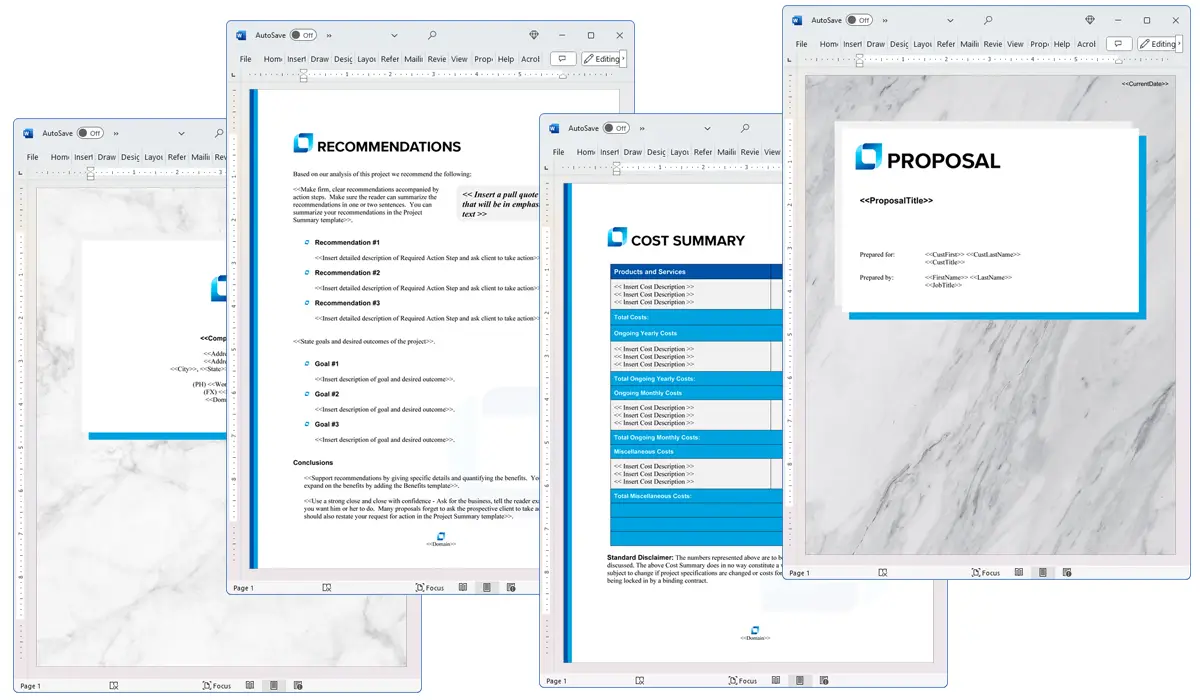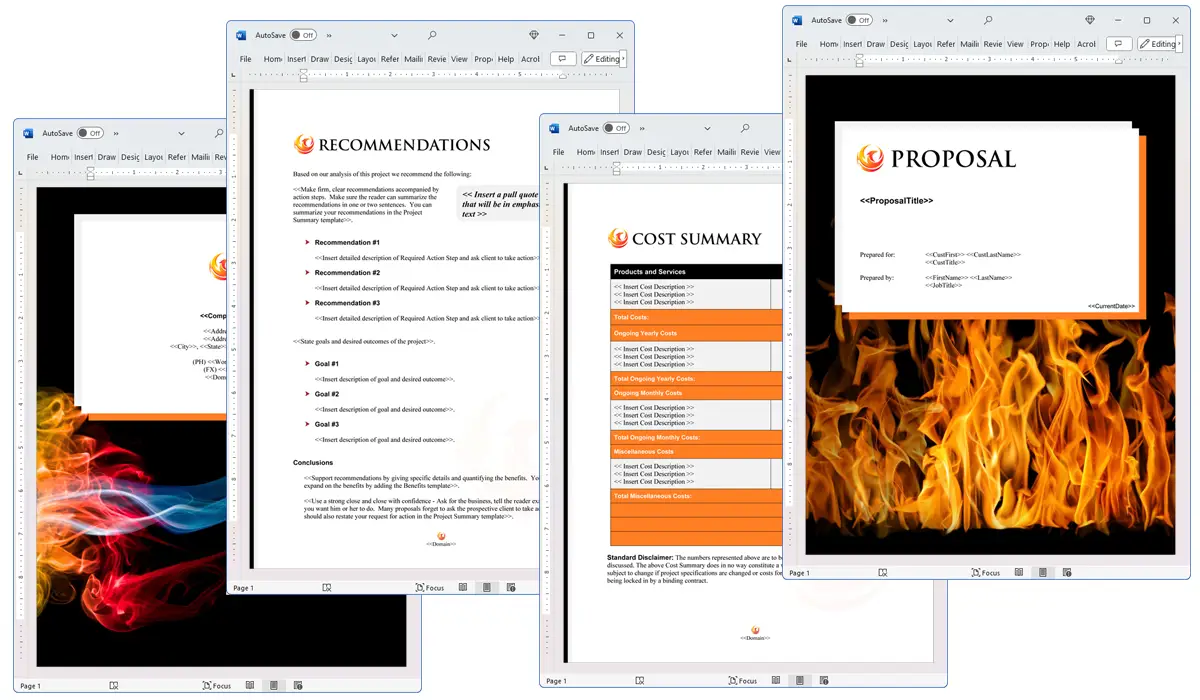What is the Simulations chapter used for?
Proposal Kit Professional Bundle adds more design themes, all six Contract Packs,
a project management library, and Expert Edition software.

Illustration of Proposal Pack Classic #19
We include this Simulations chapter template in every Proposal Pack, along with thousands more. You assemble this chapter with others in various combinations to create custom-tailored business proposals, plans, reports, and other documents. Proposal Packs apply custom visual designs to the templates, giving the final documents a consistent professional finish.
 DOWNLOADABLE, ONE-TIME COST, NO SUBSCRIPTION FEES
DOWNLOADABLE, ONE-TIME COST, NO SUBSCRIPTION FEES
Overview of the Simulations Chapter
When creating a business proposal, it is crucial to demonstrate not only what needs to be done but also how the proposed solutions can work in real-world scenarios. This is where the Simulations chapter comes into play. This particular chapter template helps businesses describe simulations they plan to undertake, which are essentially models or imitations of specific processes or situations. By incorporating this chapter, a proposal can convey a clear and convincing scenario that helps stakeholders visualize the effectiveness and feasibility of a proposed plan.
How is the Simulations Chapter Used?
In a business proposal, the Simulations chapter is used to articulate how a company intends to model or test a theory or a process before it is rolled out on a larger scale. This section is particularly important when the proposal aims to introduce new processes, tools, or strategies that require validation through simulated scenarios. The inclusion of this chapter helps the reader understand how assumptions are tested and validated, which in turn can significantly boost the proposal's credibility and persuasiveness.
What is Included in the Simulations Chapter?
The Simulations chapter typically includes several key elements:
- Objective of the Simulation: Clearly defining what the simulation aims to achieve or test.
- Methodology: Describing how the simulation will be conducted, including the tools, technologies, and resources that will be used.
- Expected Outcomes: Outlining what results are anticipated from the simulation.
- Data Collection and Analysis: Explaining how data will be gathered during the simulation and the methods for its analysis.
- Implementation Plan: Detailing how the simulation will be integrated into the overall project timeline and its potential impacts.
Use Case Examples for the Simulations Chapter
- New Product Development: Testing product designs under various conditions to predict performance and identify potential issues.
- Software Engineering: Simulating software performance in different operating environments to ensure robustness and functionality.
- Healthcare: Modeling emergency room operations to improve patient flow and reduce waiting times.
- Education: Simulating classroom management strategies to enhance learning outcomes.
- Urban Planning: Using simulations to assess traffic patterns and the impact of new infrastructure projects on city dynamics.
Key Takeaways
- Highly Relevant: The Simulations chapter is crucial for proposals that require validation of concepts through modeled scenarios.
- Builds Credibility: Including simulated outcomes helps build trust and confidence among stakeholders.
- Shows Preparedness: Demonstrates thorough planning and readiness to mitigate risks.
- Data-Driven: Highlights a commitment to data collection and empirical evidence.
- Versatile Application: Can be adapted for use across various industries and project types.

Illustration of Proposal Pack Events #5
 What Our Clients Say
What Our Clients SayI ran out my first proposal and it was fantastic! Thank you!"
 4.7 stars, based on 845 reviews
4.7 stars, based on 845 reviewsAlternate Chapters
Related Chapters
Samples Using the Simulations Chapter
Document Layouts Using the Simulations Chapter

The Simulations chapter and other chapters are integrated into a Word document as illustrated here in the Proposal Pack Symbols #10 design theme. There are hundreds of design themes available, and every design theme includes the Simulations chapter template.
A proper business proposal will include multiple chapters. This chapter is just one of many you can build into your proposal. We include the complete fill-in-the-blank template in our Proposal Pack template collections. We also include a library of sample proposals illustrating how companies in different industries, both large and small, have written proposals using our Proposal Packs. This template will show you how to write the Simulations.
We include a chapter library for you to build from based on your needs. All proposals are different and have different needs and goals. Pick the chapters from our collection and organize them as needed for your proposal.
Using the Proposal Pack template library, you can create any business proposal, report, study, plan, or document.
 Ian Lauder has been helping businesses write their proposals and contracts for two decades. Ian is the owner and founder of Proposal Kit, one of the original sources of business proposal and contract software products started in 1997.
Ian Lauder has been helping businesses write their proposals and contracts for two decades. Ian is the owner and founder of Proposal Kit, one of the original sources of business proposal and contract software products started in 1997.By Ian Lauder
 Published by Proposal Kit, Inc.
Published by Proposal Kit, Inc.


 Cart
Cart
 Facebook
Facebook YouTube
YouTube X
X Search Site
Search Site